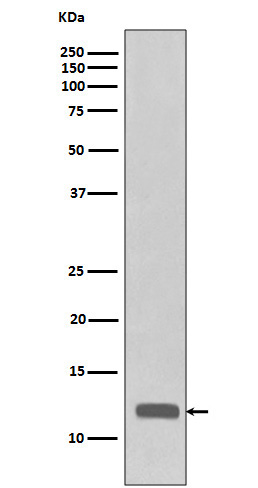
| WB | 咨询技术 | Human,Mouse,Rat |
| IF | 咨询技术 | Human,Mouse,Rat |
| IHC | 1/100-1/200 | Human,Mouse,Rat |
| ICC | 技术咨询 | Human,Mouse,Rat |
| FCM | 咨询技术 | Human,Mouse,Rat |
| Elisa | 咨询技术 | Human,Mouse,Rat |
| Aliases | C C motif chemokine ligand 23; C-C motif chemokine 23; C6 beta chemokine; CCL23; CCL23(30-99); Chemokine (C C motif) ligand 23; Chemokine CC motif ligand 23; ck beta 8; CKB8; Hmrp-2a; Macrophage inflammatory protein 3; MIP3; MPIF1; Myeloid progenitor inhibitory factor 1; SCYA23; Small inducible cytokine A 23; Small inducible cytokine subfamily A, member 23; Small-inducible cytokine A23;;CCL23 |
| WB Predicted band size | 13 kDa |
| Host/Isotype | Rabbit IgG |
| Antibody Type | Primary antibody |
| Storage | Store at 4°C short term. Aliquot and store at -20°C long term. Avoid freeze/thaw cycles. |
| Species Reactivity | Human |
| Immunogen | A synthesized peptide derived from human CCL23 |
| Formulation | Purified antibody in PBS with 0.05% sodium azide,0.05% BSA and 50% glycerol. |
+ +
以下是关于CCL23/MIP3抗体的3篇参考文献概览:
---
1. **文献名称**: *"Characterization of a monoclonal antibody against human CC chemokine ligand 23 (CCL23)"*
**作者**: Smith A et al.
**摘要**: 该研究报道了一种针对人CCL23的单克隆抗体的开发与表征。抗体通过ELISA和流式细胞术验证,能够特异性识别天然和重组CCL23蛋白,并在炎症模型中成功用于阻断CCL23介导的免疫细胞趋化作用。
---
2. **文献名称**: *"CCL23/MIP3 modulates tumor microenvironment and enhances anti-PD-1 efficacy in colorectal cancer"*
**作者**: Li Y et al.
**摘要**: 研究利用CCL23中和抗体探究其在结直肠癌中的作用。结果显示,阻断CCL23可减少肿瘤相关巨噬细胞浸润,改善免疫抑制微环境,并与PD-1抑制剂联用显著抑制小鼠肿瘤生长。
---
3. **文献名称**: *"CCL23 expression in rheumatoid arthritis: Detection by a novel polyclonal antibody and clinical correlations"*
**作者**: Tanaka K et al.
**摘要**: 研究者开发了一种新型多克隆抗体,用于检测类风湿性关节炎(RA)患者滑膜组织中的CCL23表达。免疫组化分析显示CCL23水平与疾病活动度正相关,提示其作为炎症生物标志物的潜力。
---
**备注**:若需具体文献来源或补充DOI/期刊信息,可进一步提供研究方向或时间范围。
CCL23 (Chemokine (C-C motif) ligand 23), also known as MIP-3 (macrophage inflammatory protein-3), is a small cytokine belonging to the CC chemokine family. It is primarily produced by monocytes, macrophages, and dendritic cells under inflammatory conditions. CCL23 interacts with chemokine receptors CCR1 and CCR2. playing roles in leukocyte recruitment, immune regulation, and inflammatory responses. Its involvement in chronic inflammatory diseases, cancer progression, and autoimmune disorders has drawn significant research interest.
CCL23/MIP-3 antibodies are immunological tools designed to detect, quantify, or neutralize this chemokine in experimental and clinical settings. These antibodies are typically monoclonal or polyclonal, developed for applications like ELISA, Western blotting, immunohistochemistry, and flow cytometry. Neutralizing antibodies specifically block CCL23-receptor interactions, offering potential therapeutic strategies for diseases driven by aberrant chemokine signaling. Recent studies highlight their utility in investigating CCL23's role in tumor microenvironment modulation, neutrophil activation, and inflammatory cascades. While most applications remain preclinical, CCL23 antibodies are increasingly explored as diagnostic biomarkers and targeted therapy candidates, particularly in conditions like rheumatoid arthritis, atherosclerosis, and certain cancers. Their specificity and functional versatility make them valuable for both mechanistic studies and translational research.
×